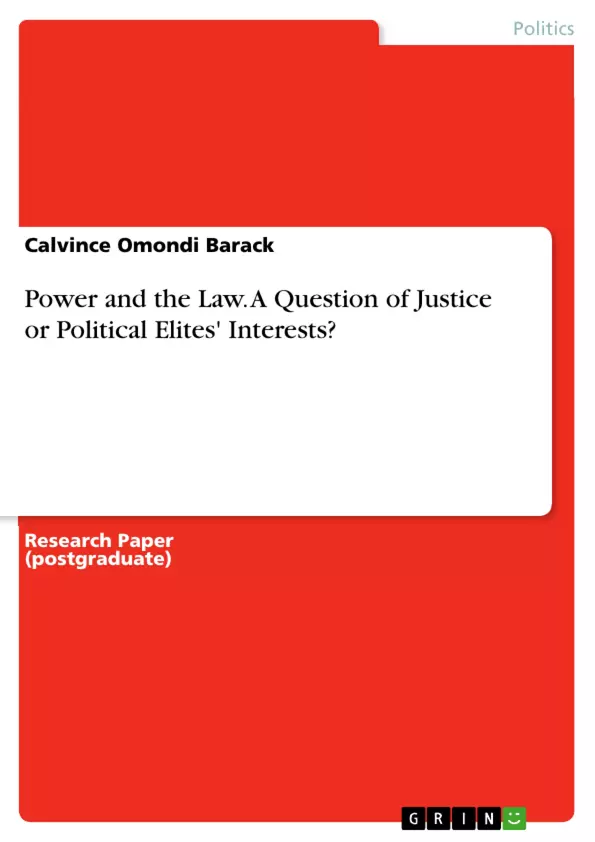This paper contributes to the understanding of the relationship between law and power. Premised on the Hobbesian conceptualization of law as the command of the sovereign, this paper traces the resilience of this conceptualization through to the modern democratic states. It looks at the change of the sovereign from an individual to an office and now the diffusion of power through different systems of checks and balances instituted by the modern political system of democracy.
In doing this, the paper answers the question; to what extent is law the reflection of the wishes of political elites in a society? It explores the sources of law and the role of law as an organizing agent with a view of exposing the resilience of the political elite’s interests in law and in the use of law. The paper finally concludes that despite the changing nature of political systems, political elites have been able to preserve the law as a tool at their service. They have used their law making power to express their wishes in the law as well as used the complex procedural nature of law with several actors involved to serve their interest.
Inhaltsverzeichnis (Table of Contents)
- Abstract
- Introduction
- The question of Power, the Law and Justice
- Law as an order of the sovereign
- Divine Power and the Law
- Law as an empowering agent
- Law as a reflection of the dominant class
- Contemporary Political Elites and the Law
- Conclusion
Zielsetzung und Themenschwerpunkte (Objectives and Key Themes)
This paper examines the complex relationship between law and power, particularly the influence of political elites on legal systems. Building upon Hobbes' theory of law as the command of the sovereign, the paper traces how this concept has persisted in modern democratic states. It analyzes the evolution of the sovereign, from an individual to an office and then to a more diffused system of checks and balances, as well as the impact of legal pluralism on the relationship between power and law. Ultimately, it aims to determine the extent to which law reflects the wishes of political elites.
- The historical evolution of the concept of law and its relation to power.
- The influence of political elites on legal systems and their use of law to further their interests.
- The role of law as an organizing agent and its impact on social order and individual behavior.
- The concept of justice and its relationship to law and power.
- The challenges of understanding the relationship between law and power in the context of legal pluralism and the diffusion of power.
Zusammenfassung der Kapitel (Chapter Summaries)
The introduction explores the contentious relationship between law and power and introduces contrasting perspectives on both concepts. It delves into Hobbes’ view of law as the command of the sovereign and its implications for understanding the relationship between power and law. The paper then examines the evolving nature of sovereignty and the emergence of legal pluralism, highlighting the complexities of the relationship between power and law in contemporary societies.
The subsequent section delves into the question of power, law, and justice. It analyzes John Austin's command theory of law, which echoes Hobbes' view, and discusses its implications for understanding the nature of justice. It then presents contrasting perspectives on justice, highlighting the view of justice as the advantage of the stronger and the implications for the relationship between the ruling elite and the law. Finally, it examines the argument that justice is obedience to the laws of one's state and the connection between justice and the wishes of the ruling elite.
Schlüsselwörter (Keywords)
This paper explores the relationship between law, power, and justice, focusing on the influence of political elites on legal systems. It examines the concepts of sovereignty, legal pluralism, justice, and the role of law as a reflection of the wishes of the ruling class. Key themes include the historical evolution of law and its relationship to power, the impact of political elites on lawmaking, the role of law as an organizing agent, and the implications of these relationships for social order and individual behavior.
Frequently Asked Questions
How is the relationship between law and power defined?
Building on Hobbesian theory, law is often seen as the command of the sovereign, used by political elites to express their interests and maintain social order.
Does law reflect the wishes of political elites?
The paper argues that despite democratic checks and balances, political elites often use law-making power and complex procedures to serve their own interests.
What is John Austin's command theory of law?
Austin's theory, echoing Hobbes, posits that law is a command backed by a threat of sanction from a sovereign to a subject.
How does the concept of justice relate to the ruling class?
The paper explores the perspective that justice may be interpreted as "the advantage of the stronger," where obedience to state law serves the ruling elite.
What is legal pluralism?
Legal pluralism refers to the existence of multiple legal systems within a single population or geographic area, complicating the direct relationship between a single sovereign power and the law.
- Quote paper
- Calvince Omondi Barack (Author), 2018, Power and the Law. A Question of Justice or Political Elites' Interests?, Munich, GRIN Verlag, https://www.grin.com/document/417985



